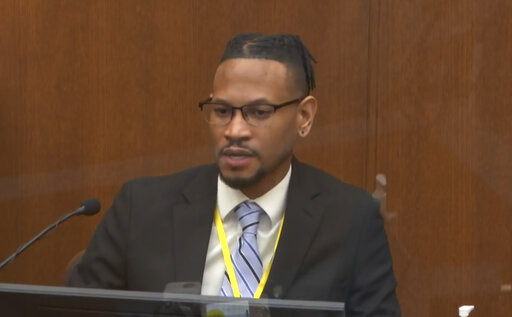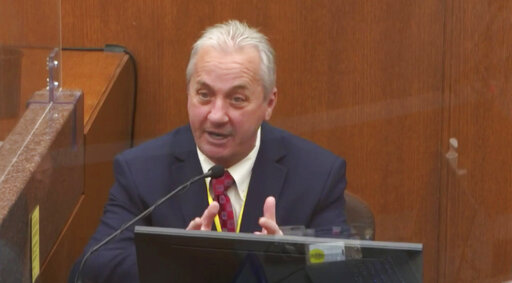Chauvin trial: Kneeling on neck ‘deadly force’ and ‘totally unnecessary’ says police lieutenant
MINNEAPOLIS (NewsNation Now) — The trial of a former Minneapolis police officer, Derek Chauvin, charged in the death of George Floyd continued Friday with testimony from officers who secured the scene after the deadly arrest.
A Minneapolis homicide investigator described Chauvin kneeling on Floyd’s neck during the May 25, 2020 arrest as “totally unnecessary” and “top-tier, deadly force.”
NewsNation will provide live coverage of the trial online and the NewsNation Now app. You can watch the trial here.

The first witness to take the stand Friday, Sgt. Jon Edwards, the overnight supervisor the night Floyd died, has been with the Minneapolis Police Department since 2007. Edwards arrived at the scene near Cup Foods to secure and canvas the area.
Two of the four officers charged in Floyd’s death, officers J. Alexander Kueng and Thomas Lane — charged with aiding and abetting murder and manslaughter — remained on the scene when Edwards arrived.
Edwards’ body camera was on and he requested that Kueng and Lane turn their body cameras on. Edwards also requested Keung and Lane exit their police squad and secured the vehicle.
Lt. Richard Zimmerman arrived at the scene at 38th and Chicago after Floyd’s arrest. Zimmerman has served with Minneapolis Police since 1985, becoming chief homicide detective in 2006, and is currently the department’s most senior officer.
After assessing that Keung and Lane were “involved officers” Zimmerman called for transport officers. Per protocol, “involved officers” are required to be interviewed in Room 100 in City Hall, and must be escorted in separate cars by supervisors.
Zimmerman testified that officers are trained to respond to threats with the proportionate “use of force” continuum. He described the policy as levels beginning from an officer’s arrival on the scene in uniform, to verbal presence, use of soft technique — escorting person by the arm, then the use of hard technique — mace or handcuffs, and finally the top tier response as deadly force.

Asked by a prosecutor what level of force kneeling on a person’s neck is, Zimmerman replied “Top tier… deadly force. Because the fact that if your knee is on a person’s neck, that can kill him,” adding it was “totally unnecessary.”
Once Floyd was handcuffed, Zimmerman saw “no reason for why the officers felt they were in danger, if that’s what they felt, and that’s what they would have to feel to be able to use that kind of force.”
He also testified that officers have a duty to provide care for a person in distress during an arrest and are trained to give first aid, even if an ambulance has already been called.
“Once you’ve secured or handcuffed a person you need to get them out of the prone position as soon as possible because it restricts their breathing,” he said. “Pulling him down to the ground face down, and putting your knee on the neck for that amount of time is just uncalled for.”
When a person is handcuffed in the prone position, “your muscles are pulling back … and if you’re laying on your chest, that’s constricting your breathing even more,” Zimmerman said.
“His safety is your responsibility, his wellbeing is your responsibility,” he told the jury.
In cross-examination, Zimmerman agreed when Eric Nelson, Chauvin’s lead lawyer, pointed out that the lieutenant does not train officers in how to use restraints and that as an investigator he has to use force less often than a patrolling officer.
Nelson peppered Zimmerman with questions about use of force, pointing out that officers must consider the entire situation when deciding about whether to use force — including what is happening with a suspect, whether the suspect is under the influence, and other surrounding hazards, such as a crowd.
Zimmerman agreed with Nelson that a person who is handcuffed can still pose a threat and can continue to thrash around.
A recap of Day 4 testimony
Courtney Ross, Floyd’s girlfriend, described her relationship with Floyd during testimony Thursday — from a first kiss to date nights at restaurants, but also spoke about how an addiction to painkillers took hold of their life together.
“It’s a classic story of how many people get addicted to opioids,” Ross said. “We both suffered from chronic pain: mine was in my neck, his was in his back.”
She said they “tried really hard to break that addiction many times.”
Chauvin’s lawyers argue that Floyd’s death, which the county medical examiner ruled a homicide at the hands of police, was really an overdose from the fentanyl found in his blood at an autopsy.
Prosecutors have said Nelson, Chauvin’s lead attorney, has sought to raise the drug use in an effort to muddy Floyd’s character and that the theory would be contradicted by medical evidence.
Nelson seemed to acknowledge the sensitivity when he stood up to cross-examine Ross: “I’m sorry to hear about your struggles with opioid addiction,” he began. “Thank you for sharing that with the jury.”
Lawyers for Floyd’s family, Ben Crump and Antonio Romanucci, criticized Chauvin’s defense in a joint statement: “Tens of thousands of Americans struggle with self-medication and opioid abuse and are treated with dignity, respect and support, not brutality,” their statement said.
Prosecutors used a legal doctrine called “spark of life” to call Ross to testify about Floyd’s life, and are expected to call a Floyd family member to the witness stand later. Minnesota is a rarity in explicitly permitting such “spark of life” testimony ahead of a verdict. Defense attorneys often complain that such testimony allows prosecutors to play on jurors’ emotions.
Paramedics who arrived at the scene testified Thursday they had to move police off Floyd, who by then had stopped breathing, had no pulse and whose pupils were dilated.
A paramedic who arrived on the scene that day testified that the first call was a Code 2, for someone with a mouth injury, but it was upgraded a minute and a half later to Code 3 -– a life-threatening incident that led them to turn on the lights and siren.
Paramedic Seth Bravinder said he saw no signs that Floyd was breathing or moving, and it appeared he was in cardiac arrest. A second paramedic, Derek Smith, testified that he checked for a pulse and couldn’t detect one.
“In lay terms,” Smith told the jury, “I thought he was dead.”
Chauvin told retired Minneapolis Police Sergeant David Pleoger in a brief phone conversation that Floyd was combative during the deadly incident, according to a recording of the call played at the trial.
“We just had to hold a guy down who was going crazy on the back of the passenger floor,” Chauvin was heard telling Pleoger. Testifying on Thursday, Pleoger said Chauvin later acknowledged having knelt on Floyd or his neck.
Pleoger noted that officers are trained to roll people on their side to help with their breathing after they have been restrained in the prone position.
“When Mr. Floyd was no longer offering up any resistance to the officers, they could have ended the restraint,” Pleoger said.
Chauvin, 45, who is white, is charged with murder and manslaughter, accused of killing the 46-year-old Black man by kneeling on Floyd’s neck for 9 minutes, 29 seconds, as he lay face-down in handcuffs. The most serious charge against the now-fired officer carries up to 40 years in prison.









